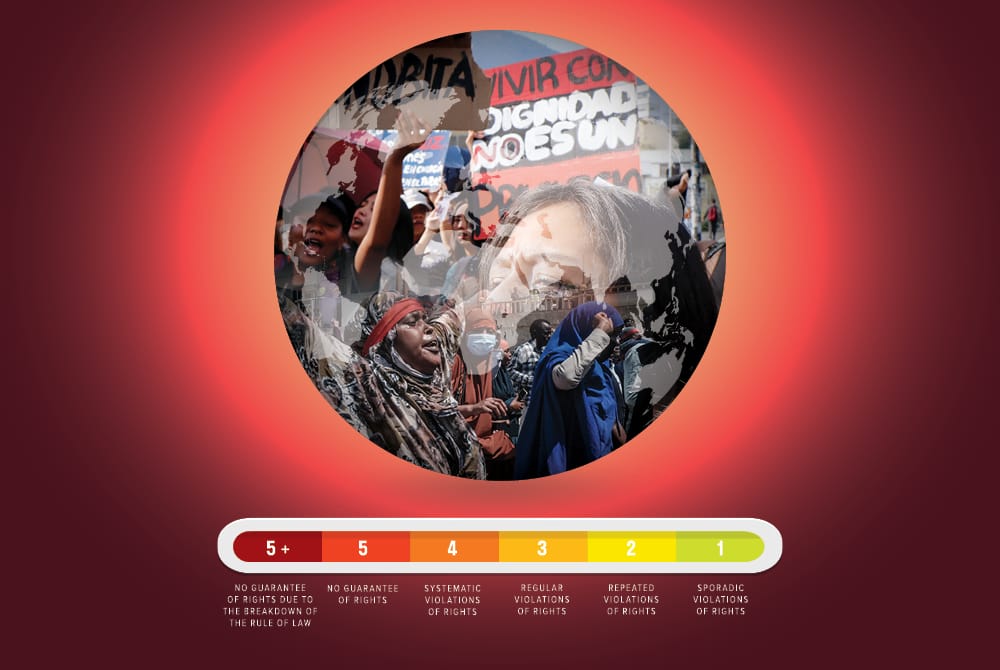
On June 2, the International Trade Union Confederation (ITUC) released its 12th annual Global Rights Index. The yearly report tracks violations of workers’ and union rights around the world. Its findings are troubling, to say the least.
“This year’s Index reveals a stark and worsening global crisis for workers and unions,” the report says. The data reveals sharp escalations in violations of key worker rights, including the right to form and join unions, the right to strike, and the right to collective bargaining. Over the 12 years in which the ITUC has been tracking such trends, violations of these various rights have grown considerably.
According to the 2025 report, the right to form unions and have them legally recognized was violated in 74 per cent of countries. This was unchanged from the previous year, though still the worst recorded figure since the ITUC first began issuing its Global Index in 2014.
Violations of the right to collectively bargain were up marginally from 2024’s report. According to this year’s figures, 80 per cent of countries infringed this fundamental worker right. The ITUC records both government and corporate violations. For example, in France, nearly four in every 10 collective agreements were imposed by employers without union consultation. In Sweden, Elon Musk continues to refuse to recognize unionized mechanics at Tesla.
At the same time, 87 per cent of countries violated workers’ right to strike. That’s 131 countries, including Canada, who in one way or another interfered with unions’ ability to lawfully strike. This despite the fact that 158 of the 187 International Labour Organization (ILO) member states have ratified ILO Convention 87, which ostensibly enshrines the rights to freely associate and form unions.
Moreover, fundamental liberal protections such as rights to justice, free assembly and civil liberties were frequently violated around the world, according to the ITUC’s findings.
In 72 per cent of countries, workers had no or reduced access to justice, an increase from 65 per cent in the year prior. Attacks on free speech and assembly were also up. Although the report records a modest increase from 43 to 45 per cent of surveyed countries, this is the highest incidence of violations of these rights since the Index began.
The growth in the power and strength of the populist right and its increasingly authoritarian governments is offered as one explanation for the further erosion of worker and union rights. Right-wing leaders, such as Javier Milei in Argentina, Petteri Orpo in Finland and Giorgia Meloni in Italy, have pursued anti-union ‘reform’ projects, including limiting the right to strike and eroding other employment and social protections.
The report also notes a worrying trend whereby authoritarian governments are adopting laws that criminalize unions as “foreign agents,” subjecting labour leaders to arrest and detention under the pretext of national security. In addition, 71 countries (47 per cent of those surveyed) imprisoned workers, which represented a marginal improvement from last year but still almost double the rate recorded in 2014. Workers and union leaders also continued to suffer violence in 26 per cent of countries, a slight improvement from last year.
The most difficult region of the world to be a worker or union member remains the Middle East and North Africa.
The ITUC rates countries on a scale of 1 to 5+, based on the extent and frequency of labour violations. In this year’s report, a total of 51 countries were rated either 5, indicating “no guarantee of rights,” or 5+, where “rights cannot be guaranteed due to the breakdown of law.” This marks an increase of 19 countries since 2014. According to 2025’s Global Rights Index, the 10 worst countries for workers were Bangladesh, Belarus, Ecuador, Egypt, Eswatini, Myanmar, Nigeria, the Philippines, Tunisia and Turkey.
Yet, the deterioration of workers’ rights is far from a problem confined to the Global South or developing countries — North America and Europe are the sites of some of the worst backsliding. As ITUC general secretary Luc Triangle notes in the report’s foreword, “In 2025, average country ratings deteriorated in three out of five global regions, with Europe and the Americas recording their worst scores since the Index’s inception in 2014.”
The United States and Canada, in particular, are cited for various violations. For example, since Donald Trump assumed the U.S. presidency, his administration has “taken a wrecking ball to the collective labour rights of workers” by unilaterally firing thousands of public servants, tearing up collective agreements, kneecapping the National Labor Relations Board and thus frustrating the efforts of workers to form or join unions.
In Canada, the ITUC flags the federal government’s repeated use of s. 107 of the Canada Labour Code last year as a particularly undemocratic means of infringing on workers’ right to strike. While the introduction of federal anti-scab legislation is recorded as a meaningful expansion of union rights, this is outweighed by the persistent undermining of the right to strike in Canada. As the report points out, “The new [anti-scab] legislation marks significant progress in a country where laws and regulations still restrict workers and their representatives in organising and participating in strikes.”
The ITUC ranked Canada a 3, for “regularly interfering in collective labour rights or failing to fully guarantee important aspects of these rights.” In countries with this ranking, “there are deficiencies in laws and/or certain practices which make frequent violations possible.”
In the Americas overall, the protection of workers’ rights has deteriorated considerably since the ITUC began issuing reports. “In 2025, 92% of countries in the region restricted the registration of trade unions, while workers were arrested or detained in six out of every 10 countries. In addition, 88% of countries violated the right to strike,” the report documents.
In Europe as well, conditions have notably worsened over the past decade. The ITUC has downgraded the region’s average rating to 2.78 from 2.73 the previous year, while noting that nearly three-quarters of European countries violated the right to strike, almost a third arrested or detained workers, and more than half restricted access to justice. The rise of the populist and authoritarian right, in particular, has heightened the risk of the further erosion of rights. Even countries like the United Kingdom have stretched the definition of “essential services” to restrict the right to strike.
Only seven out of 151 surveyed countries received a top-tier rating of 1 for their protection of workers’ and union rights. These were Austria, Denmark, Germany, Iceland, Ireland, Norway and Sweden. In 2014, by contrast, there were 18 top-rated countries.
Additionally, only three countries improved their rating from last year: Australia, Mexico and Oman. This highlights the degree to which the trend has been toward worsening conditions for workers and unions globally.
As the report starkly summarizes, “We are witnessing a coup against democracy: a concerted, sustained assault by state authorities and the corporate underminers of democracy on the rights and welfare of workers.” It continues, “Increasingly, this attack is orchestrated by far-right demagogues backed by billionaires who are determined to reshape the world in their own interests at the expense of ordinary working people.”
At the same time, workers and unions are fighting back, though the struggle remains protracted and difficult.
On a hopeful note, the ITUC concludes: “As the world’s largest democratic force, the union movement embodies the collective power of working people everywhere. Together, we can build a sustainable world where all workers are free to exercise their basic rights and freedoms.”
In the face of the widespread violations of workers’ rights, as well as the obstinance of authoritarian governments and employers, unions have their work cut out for them. Forging new ways to struggle, resist and build global solidarity remains the daunting yet necessary task.
Recent Class Struggle Issues
- June 2 | Israeli Products Should Have No Place In Canada
- May 26 | Can CUPW Prevent The Erosion Of Full-Time Work At Canada Post?
- May 19 | Reviewing The State Of The Labour Market – April 2025
- May 5 | Total Catastrophe Was Avoided, But Canada Is Heading Rightward







